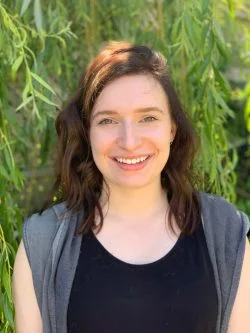Time paradox terrain
The Other Valley
by Scott Alexander Howard
Toronto: Scribner Canada, 2024
$24.99 / 9781668023563
Reviewed by Zoe McKenna
*

The question is as old as time: “If you had the opportunity to change the past, would you?” Yet, in Vancouver-based author Scott Alexander Howard’s The Other Valley, the question feels revolutionary.
Odile is sixteen-years-old and attempting to carve a path into adulthood while navigating her final months of high school. She’s reserved, unsocial—a wallflower. Her life exists within the confines of a small town in the middle of a valley. Odile is fighting for a place on the Conseil, a board of community leaders who determine whether people are permitted to travel out of town to visit the neighbouring valleys to the east and west. At first blush this system seems militant, but things are more complicated than they first appear. To the east is an exact replica of Odile’s town, but twenty years in the future. To the west—and twenty years in the past—stands another duplicate of her town.
Offering power, influence, and financial security, a place on the Conseil would have a life-changing impact for Odile. But before her training is over, Odile stumbles upon two masked visitors to her valley. She sees a couple that’s been permitted to pass the border to catch a final glimpse of someone who is no longer alive in their eastern home two decades in the future.
Worse, Odile recognizes the mourners as her friend Edme’s parents, and quickly understands that while he is still alive in her timeline, he is soon to die, and there is nothing she can safely do to interfere.

Howard’s exploration of the highs and lows (the peaks and valleys, as it were) of first love is deeply earnest in a way that rings of young adult novels, not heady science fiction. Odile and Edme draw closer to each other step-in-step with her cemented understanding of his limited span left on their world. It’s heartbreaking—the longer Edme is on the page, the clearer the gap he will leave behind becomes. They are doomed lovers from the start, and the slowness and softness with which the two uncertain teenagers come to care for each other makes Edme’s fate all the more devastating.
There are countless novels led by gangly young adults who stumble into unfortunate circumstances. Romance novels led by star-crossed lovers are some of the oldest stories we have. Likewise, many time travel narratives delve into the grandfather paradox and muse over the question of cause and effect.
Howard’s strength is in taking concepts and characters that are familiar and inviting to us while treating them with the weight and significance of something entirely new. Gone are the intergalactic warfare narratives peppered with lasers and gadgets. The Other Valley’s plot is deliberate and carefully considered. The author’s in no rush. The irritating neighbours, curmudgeonly teachers, and new-money social elites will feel homey to anyone who grew up in a small town. Despite Howard’s blatant play with time and linearity, The Other Valley’s strength is not in taking readers out of their own world to explore another, but rather to plant them firmly in what they already know while offering the tools to look at things differently. The novel has a strong sense of time and place throughout—a challenging feat in a story with three duplicate towns in competing timelines. Howard’s gentle, measured writing style lends itself well to the creation of a debut novel with the coherency and confidence of a well-practiced author.

The Other Valley explores complicated and cerebral themes, not least of which our own egomania (which valley is the real valley, anyways?) and the boundaries of our free will. The power that Odile has to change the past or fall mercy to an unkind future is explored until the final pages. The strangeness and complexity inherent to these existential questions are embraced as just another element of Odile coming to understand herself, understand Edme, and understand her place in the world.
Despite a keen exploration of other science fiction tropes, The Other Valley is refreshingly, if surprisingly, uninterested in technology. Characters from the futuristic neighbouring valley don’t visit bearing tools and gadgets that the present-day townspeople have yet to discover. The only reason to cross the boundary from one valley to another is for love—or for all of the beautiful and terrible human emotions associated with it: joy, remorse, longing, loneliness, regret.
In this, the embrace of something so deeply human without hesitation to look at the dark underbelly, Howard appeals to any and all readers. These characters and the ideas they explore feel, for better or worse, in reach for everyone—love, friendship, loss, and grief create a story that is familiar to us all.
My favourite aspect of The Other Valley is that it’s a piece of speculative fiction that is exactly that—speculative. Howard opens his novel with a graceless teenage girl at the precipice of her life. The ugly, uncomfortable space between childhood and adulthood raises a million uncertainties. Stripped of the uncanny, multidimensional timelines, The Other Valley is fiction that asks questions, including those we might feel we should already know the answer to. There is something undeniably captivating about a novel with more questions than answers, and Howard presents, with sincerity and sophistication, a novel that proudly inquires: “What if?”
*

Zoe McKenna holds a MA from the UVic and a BA from VIU. Her thesis, as well as a great deal of her other reading and writing, focuses on horror writing in Canada, especially that by BIPOC authors. Her previous work has appeared in VIU’s Portal Magazine and Quill & Quire. When not reading, writing, or reviewing, Zoe can be found hiking a local mountain or in front of a movie with her two cats, Florence and Delilah. She is always covered in cat hair and wears almost exclusively dark clothing to prove it. Find her on Twitter. [Editor’s note: Zoe McKenna has reviewed books by S.W. Mayse, Linda Cheng, Paul Cresey, Michelle Min Sterling, Eve Lazarus, David Wallace, David Ly & Daniel Zomparelli, Sophie Sullivan, kc dyer, Robyn Harding, and Lindsay Cameron for BCR.]
*
The British Columbia Review
Interim Editors, 2023-25: Trevor Marc Hughes (nonfiction), Brett Josef Grubisic (fiction)
Publisher: Richard Mackie
Formerly The Ormsby Review, The British Columbia Review is an on-line book review and journal service for BC writers and readers. The Advisory Board now consists of Jean Barman, Wade Davis, Robin Fisher, Barry Gough, Hugh Johnston, Kathy Mezei, Patricia Roy, Maria Tippett, and Graeme Wynn. Provincial Government Patron (since September 2018): Creative BC. Honorary Patron: Yosef Wosk. Scholarly Patron: SFU Graduate Liberal Studies. The British Columbia Review was founded in 2016 by Richard Mackie and Alan Twigg.
“Only connect.” – E.M. Forster
3 comments on “Time paradox terrain”